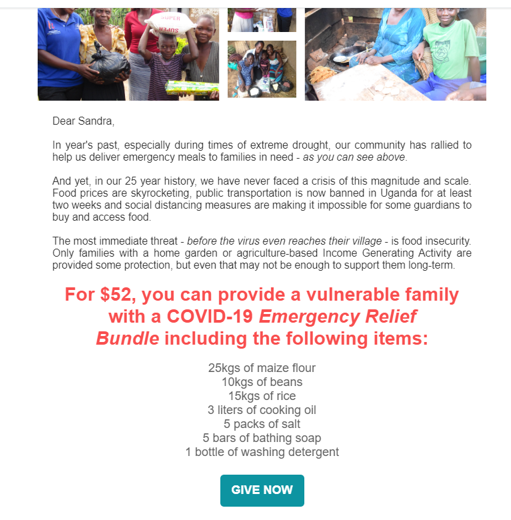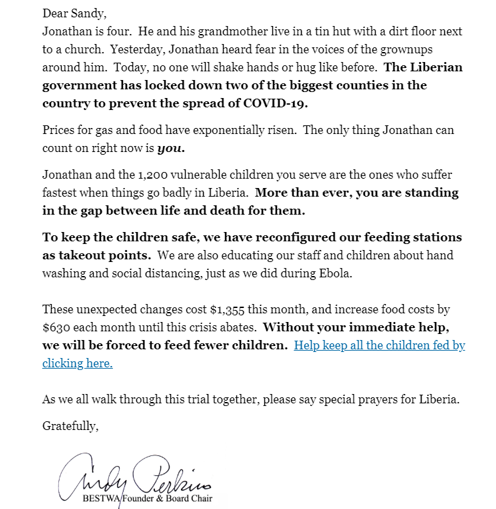 When your community, your country, or even your planet is in the midst of a crisis, you may need to send out an emergency appeal for donations to ensure your nonprofit’s continued operations or even survival.
When your community, your country, or even your planet is in the midst of a crisis, you may need to send out an emergency appeal for donations to ensure your nonprofit’s continued operations or even survival.
And you need to get it right.
With everyone’s attention on the crisis at hand, the last thing you want to do is seem insensitive or callous. That could damage your organization’s reputation.
A crisis usually causes chaos and that means more people hurting than usual.
In the midst of the coronavirus pandemic, thousands of people have already lost their jobs and are trying to figure out how to make ends meet.
Seems like a bad time to be asking for money, right?
Yet, you need to. Especially if you just cancelled all your Spring fundraising activities or are trying to salvage your fundraising event.
Even when there’s a crisis (or maybe BECAUSE there’s a crisis), your mission still needs to be fulfilled.
If those you serve are directly impacted by the crisis, you’ll probably see a dramatic increase in the need and that means you need more funds to pay for it.
Plus, it’s more important than ever for you to advocate for those you serve and make sure that your nonprofit will be able to continue serving them through and after the crisis.
So, what do you say to get people to give during a crisis?
Let’s look at what a sensitive, compelling emergency appeal looks like.
Your emergency appeal starts with your mission
Not every emergency appeal is created equally.
When dealing with a natural disaster or pandemic, nonprofits can be separated into two categories:
- Those who serve a population that is DIRECTLY impacted (human and animal life-sustaining services: food banks, homeless services, shelters, domestic violence, etc.).
- Those who serve a population that is NOT DIRECTLY affected, but whose work still impacts the community and is necessary to the wellness of others (arts, non-life sustaining beneficiary causes).
 If those you serve are DIRECTLY impacted:
If those you serve are DIRECTLY impacted:
If you provide life-sustaining services, your appeal should be easy to write. The need is immediate and understandable, and the urgency for people to give is obvious.
You should cite REAL examples of WHY you need funding NOW. For example, a food pantry might say “We normally serve 60 families a week and this week we’ve already seen 180.”
You should explain how your recipients are affected, why they are affected, what you’re trying to do about it, and why it matters.
If those you serve are NOT directly impacted:
If the recipients of your work are not directly impacted (if you don’t provide basic human or animal survival services), the message in your appeal needs to remind people that your nonprofit serves a valuable purpose and you need to be READY to get back to the need as soon as you’re able to.
For example, an arts organization might say “You may have experienced first-hand the need for quality entertainment during your sheltering-at-home. At the ABC Center for the Performing Arts, we are passionate about offering amazing experiences for our community, and we’re committed to offering performances when it’s safe to gather in groups again.”
Be really careful not to compare your nonprofit to those in the first group. It doesn’t help for you to position your nonprofit as ‘less than’ a more deserving one.
Listen, for every cause, there’s a reason to give. As long as you know yours and can articulate it for your supporters, you can raise money during a crisis and beyond. So, if you aren’t clear about that, it might be a good idea to hit the pause button for a moment and work on it.
Now let’s look at a template for structuring an emergency appeal.
9-point emergency appeal template
1. Nail the subject line. Step one is to get the email opened and that’s the subject line’s job. Take some time to get this right. Don’t just toss some words together so you can hurry up and get this out the door. Don’t make it predictable. It needs to be hooky and grab attention. Instead of “COVID-19 CRISIS APPEAL,” use something like “the kids could desperately use your help right now.”
| Good subject lines taken right from my inbox: | Bad subject lines taken right from my inbox: |
|---|---|
| You can make a difference | A message from the Executive Director |
| Give meals and hope this Easter | UPDATE: Our “rainy day” fund |
| This is unthinkable | COVID-19 UPDATE |
| Important Update on COVID-19 |
You tell me – which emails would YOU open?
2. Personalize the appeal. Begin your emergency appeal using the recipient’s name. This is NO TIME for ‘Dear friend.’ If you don’t know how to personalize your email, find someone to help you. Think about it – who do you respond to in a crisis? Friends? Family? Or random strangers? If you can’t call people by name, your chances of getting a donation just dropped.
3. Declare the urgency. Get right to the point in your appeal and say why you need help and why you need it NOW. Eliminate all filler words like “I wanted to take this opportunity to write to you to tell you that…” None of that is necessary. Just get right to the point like this: “The need for emergency food boxes is 4 times our average and we need your help to meet the need.”
4. Explain the blow. Describe how the crisis is impacting those you serve. Don’t start by saying how bad your financial situation is. That’s not a strong reason for someone to give. Instead, share the impact the crisis is having on those you serve.
Here’s a good example of explaining the blow from Children of Uganda:

5. Share a story. Tell a story about one person or one family or one animal and how that one is hurting because of the situation. Talk about what they’ve lost and what that means for them. This will help emotionally connect the reader to the situation.
Here’s a great example of a story from BESTWA:

6. Ask for a donation to help alleviate the hurt. Tell your donor what it will cost to ease someone’s hurt. Instead of “Please give today to help us feed more of our hungry neighbors,” be more specific. “Your gift of $11.25 today will provide an emergency food box to a family in need” is much better than “Would you consider making a gift to help us continue being there for those in need?” See the difference?
7. Put it in context. Share the number of those needing your help. Share how you weren’t prepared to handle the increased need or the loss of funding sources (money to pay for increased services wasn’t in the budget, fundraising was cancelled or postponed due to the crisis, program fees were cut due to stay-at-home orders, etc.). People need to understand the whole picture to see how their help is needed.
8. Repeat the Ask. Restate your Ask and share the urgency. “Please give today so we can help struggling families put food on the table during this crisis.”
9. Reinforce the Ask on social media. After you send out your emergency appeal email, share an image and text on social media. For those who see both the email and social media posts, they’re more likely to give. You may get some donations from those who follow you on social media but aren’t on your email list.
Brazosport Cares Food Pantry changed their Facebook header to reflect their ask:

Emergency Appeal – DO
DO use specific examples and stories. For example, “Domestic violence in our community is increasing thanks to self-quarantine. Unfortunately, we are busier than ever before here at XYZ Women’s Shelter. We need your help to provide a bed and support for women like Susannah…”
DO suggest donation amounts. Asking for $100 is much clearer than asking for a ‘generous donation.’ Use your Core Number and offer several suggested amounts, explaining what you will do with that money. For example, “Your donation of $11.25 will provide an emergency food box for a struggling family.” Make sure you offer amounts starting between $10 and $15 since that’s an easy amount to say “yes” to for many people, even when funds are tight.
DO explain what solutions you are working on. People will be curious what your plans are and if you’re going to make it through the crisis. Share your short-term plans to build trust. For example, “At the animal shelter, we are offering curbside adoptions and virtual meet & greets. It’s important to us that we get as many animals happily placed in homes before the next wave of animals in need arrives.” If you aren’t exactly sure what you’re going to do, share that. Say “we don’t know yet if we’ll be holding our event in August or not but we expect to make a decision by mid June.”
Emergency Appeal – DON’T

Do NOT make this about your organization. The focus of fundraising right now should be on those you serve, not on your organization. YOU don’t need help – the recipients of your services do. ALWAYS talk about how the crisis is impacting those you serve. That’s what will motivate people to give right now.
Do NOT project your own fears or feelings on your donors. Remember, even though we are facing a crisis, NOT everyone is impacted. Some people are retired. Some are independently wealthy. Not everyone is worried about where their next dollar is coming from. Not everyone is struggling. So, ask for what you need and keep it authentic. Those who love your mission will give, and you might be surprised at the size of the donations you receive! It’s possible that you could see some of the biggest donations of the year in the next few weeks.
Do NOT cram tons of text into your appeal. Keep it short and sweet. During the crisis, people are incredibly distracted and won’t spend a ton of time reading your appeal. You may literally have 5 seconds to get their attention and hook them in. Get to the point fast, because if they don’t read it, they won’t give.
Do NOT state or imply that you will completely fail if you don’t raise money NOW. Would YOU give to a cause that said this? I wouldn’t! I want to know that the organization I’m supporting is solid and able to manage their funds. Even if you’re not prepared financially for this crisis, never say so. Never say “We will have to close our doors if we don’t raise $50,000 by next Friday.”
Do NOT ask for funds for a capital project, capital improvements, “rainy day fund” replenishment, or to reimburse your organization for money already spent. People are very aware there is a crisis right now, and they expect you to be addressing immediate needs — not all these other things. Ask for what you NEED, not what you DREAM of or what you WISH you had. There will be time to raise money for capital and reserves later.
Do NOT create a panicked GoFundMe campaign. If you’ve been building relationships with your donors, it’s time to ask them for help. Even if you do create a GoFundMe campaign, you’ll still have to promote it. In other words, people won’t magically find your campaign and give just because you post it there.
Just like any other appeal, a crisis appeal should be written authentically, truthfully, and compassionately.
The better job you do of tuning in to your donors, the easier it will be to write your emergency appeal. If you’re cultivating donors from a distance, ask questions and listen to what your donors are saying to you.
If you are at a loss of what to say, go back to basics. Remember what you do at the most basic level. Feed people? Clothe people? Provide shelter? Go back to that and write your appeal from the heart.
Donors who love your cause will happily give to support you during this time. They may not be able to give as large a gift as they usually do, but they will give to help.
The Bottom Line
When the world or your community is in crisis, it’s okay to ask for money.
Keep it short, straight to the point, and give people a reason to care, no matter what the situation is.
Stay focused on those you serve and connect their hurt to your donors’ hearts, and you’ll see a good response from your emergency appeal.
 Fundraising TV subscribers – look for the Coronavirus Emergency Appeal Swipe File in both the private Facebook group and the Viewer Dashboard. Not yet a subscriber? Check it out at www.GetFullyFunded.com/TV. It’s a great way to build your skill and confidence in fundraising and be part of a community of awesome fundraisers!
Fundraising TV subscribers – look for the Coronavirus Emergency Appeal Swipe File in both the private Facebook group and the Viewer Dashboard. Not yet a subscriber? Check it out at www.GetFullyFunded.com/TV. It’s a great way to build your skill and confidence in fundraising and be part of a community of awesome fundraisers!






Thank you. My fundraiser is for my own medical problems,going slowly have some or just enough now for this months prescription s,just stumped.not even funds to post a page.
Sorry Ann. We don’t help individuals raise money for personal needs. We help nonprofits and NGOs learn to raise money.